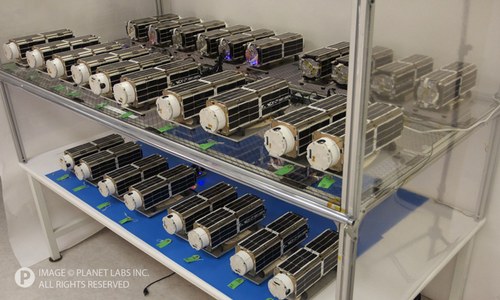
The 28 satellites of Flock 1, the first constellation of remote sensing satellites built by Planet Labs. The satellites will be launched on a Cygnus cargo spacecraft to the International Space Station in January. (credit: Planet Labs)
Less than six months after coming out of stealth mode, San Francisco-based remote sensing company Planet Labs announced a second major funding round on Wednesday. The company said it raised $52 million in a Series B round, adding some new investors in the process. This funding comes on top of the $13.1 million is raised in a previous Series A round the company formally announced when it unveiled itself in June.
Among the new investors is Yuri Milner, a Russian billionaire who may not have much name recognition outside of business circles, although the companies he’s invested in are certainly well-known. He invested in Facebook several years ago, before the company went public, and also has stakes in companies like Twitter and Zynga. “Planet Labs is revolutionizing the spacecraft sector,” Milner said in the press release announcing the financing round. “Its passionate and high performance team is utilizing elegant science and sophisticated technology in pushing the boundaries of what was thought to be possible in satellite manufacturing and deployment.”
Other new investors into Planet Labs in the Series B round include Industry Ventures, Felicis Ventures, Lux Capital, and Ray Rothrock, while the company’s original investors, including Draper Fisher Jurvetson, also participated in the round.
The company did not disclose in its release what it plans to use the funding for (and, unlike some previous company news, Planet Labs appears to focus its advance briefings on the news on technology and financial, and not space, media.) The company did tell one technology publication, TechCrunch, that it planned to hire engineers to help deal with the “torrent of new data” that will be coming in after the launch of its first constellation of satellites.
The announcement of the Series B round was timed to be on the eve of the launch of that first constellation of smallsats, dubbed Flock-1. As it turns out, though, the company, and its new investors, will have to wait a little while longer. The satellites are included in the payload of the first Cygnus cargo mission to the International Space Station, which was scheduled for launch Thursday night on an Antares rocket from Virginia. However, NASA has delayed that launch until mid-January to allow the ISS crew to first carry out repairs to a coolant loop on the station.

Leave a Reply